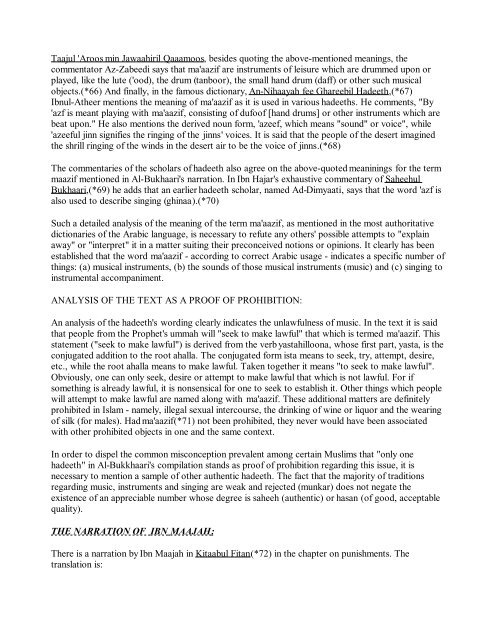The Islamic Ruling on Music and Singing - Enjoy Islam
The Islamic Ruling on Music and Singing - Enjoy Islam
The Islamic Ruling on Music and Singing - Enjoy Islam
Create successful ePaper yourself
Turn your PDF publications into a flip-book with our unique Google optimized e-Paper software.
Taajul 'Aroos min Jawaahiril Qaaamoos, besides quoting the above-menti<strong>on</strong>ed meanings, the<br />
commentator Az-Zabeedi says that ma'aazif are instruments of leisure which are drummed up<strong>on</strong> or<br />
played, like the lute ('ood), the drum (tanboor), the small h<strong>and</strong> drum (daff) or other such musical<br />
objects.(*66) And finally, in the famous dicti<strong>on</strong>ary, An-Nihaayah fee Ghareebil Hadeeth,(*67)<br />
Ibnul-Atheer menti<strong>on</strong>s the meaning of ma'aazif as it is used in various hadeeths. He comments, "By<br />
'azf is meant playing with ma'aazif, c<strong>on</strong>sisting of dufoof [h<strong>and</strong> drums] or other instruments which are<br />
beat up<strong>on</strong>." He also menti<strong>on</strong>s the derived noun form, 'azeef, which means "sound" or voice", while<br />
'azeeful jinn signifies the ringing of the jinns' voices. It is said that the people of the desert imagined<br />
the shrill ringing of the winds in the desert air to be the voice of jinns.(*68)<br />
<str<strong>on</strong>g>The</str<strong>on</strong>g> commentaries of the scholars of hadeeth also agree <strong>on</strong> the above-quoted meaninings for the term<br />
maazif menti<strong>on</strong>ed in Al-Bukhaari's narrati<strong>on</strong>. In Ibn Hajar's exhaustive commentary of Saheehul<br />
Bukhaari,(*69) he adds that an earlier hadeeth scholar, named Ad-Dimyaati, says that the word 'azf is<br />
also used to describe singing (ghinaa).(*70)<br />
Such a detailed analysis of the meaning of the term ma'aazif, as menti<strong>on</strong>ed in the most authoritative<br />
dicti<strong>on</strong>aries of the Arabic language, is necessary to refute any others' possible attempts to "explain<br />
away" or "interpret" it in a matter suiting their prec<strong>on</strong>ceived noti<strong>on</strong>s or opini<strong>on</strong>s. It clearly has been<br />
established that the word ma'aazif - according to correct Arabic usage - indicates a specific number of<br />
things: (a) musical instruments, (b) the sounds of those musical instruments (music) <strong>and</strong> (c) singing to<br />
instrumental accompaniment.<br />
ANALYSIS OF THE TEXT AS A PROOF OF PROHIBITION:<br />
An analysis of the hadeeth's wording clearly indicates the unlawfulness of music. In the text it is said<br />
that people from the Prophet's ummah will "seek to make lawful" that which is termed ma'aazif. This<br />
statement ("seek to make lawful") is derived from the verb yastahillo<strong>on</strong>a, whose first part, yasta, is the<br />
c<strong>on</strong>jugated additi<strong>on</strong> to the root ahalla. <str<strong>on</strong>g>The</str<strong>on</strong>g> c<strong>on</strong>jugated form ista means to seek, try, attempt, desire,<br />
etc., while the root ahalla means to make lawful. Taken together it means "to seek to make lawful".<br />
Obviously, <strong>on</strong>e can <strong>on</strong>ly seek, desire or attempt to make lawful that which is not lawful. For if<br />
something is already lawful, it is n<strong>on</strong>sensical for <strong>on</strong>e to seek to establish it. Other things which people<br />
will attempt to make lawful are named al<strong>on</strong>g with ma'aazif. <str<strong>on</strong>g>The</str<strong>on</strong>g>se additi<strong>on</strong>al matters are definitely<br />
prohibited in <strong>Islam</strong> - namely, illegal sexual intercourse, the drinking of wine or liquor <strong>and</strong> the wearing<br />
of silk (for males). Had ma'aazif(*71) not been prohibited, they never would have been associated<br />
with other prohibited objects in <strong>on</strong>e <strong>and</strong> the same c<strong>on</strong>text.<br />
In order to dispel the comm<strong>on</strong> misc<strong>on</strong>cepti<strong>on</strong> prevalent am<strong>on</strong>g certain Muslims that "<strong>on</strong>ly <strong>on</strong>e<br />
hadeeth" in Al-Bukkhaari's compilati<strong>on</strong> st<strong>and</strong>s as proof of prohibiti<strong>on</strong> regarding this issue, it is<br />
necessary to menti<strong>on</strong> a sample of other authentic hadeeth. <str<strong>on</strong>g>The</str<strong>on</strong>g> fact that the majority of traditi<strong>on</strong>s<br />
regarding music, instruments <strong>and</strong> singing are weak <strong>and</strong> rejected (munkar) does not negate the<br />
existence of an appreciable number whose degree is saheeh (authentic) or hasan (of good, acceptable<br />
quality).<br />
THE NARRATION OF IBN MAAJAH:<br />
<str<strong>on</strong>g>The</str<strong>on</strong>g>re is a narrati<strong>on</strong> by Ibn Maajah in Kitaabul Fitan(*72) in the chapter <strong>on</strong> punishments. <str<strong>on</strong>g>The</str<strong>on</strong>g><br />
translati<strong>on</strong> is:

















